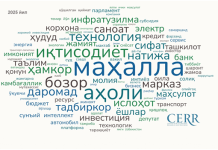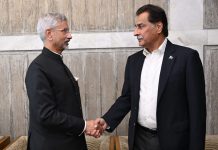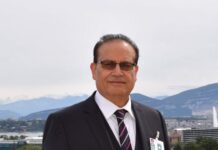By Qamar Bashir
Being a nation of 250 million people and experiencing one failure after another of our sportspersons in the Paris Olympics was heartbreaking. These defeats were not due to the failure of the players to perform in the sports arena but rather a reflection of our collective failure in almost every discipline compared to developing or developed nations.
However, it was perhaps divine intervention that nurtured an honest, pure, dedicated, and talented soul for years, saving us from a total whitewash at the Olympic Games and giving the entire nation priceless moments to relish, celebrate, and cherish.
This moment, like for me and my wife, who did not even blink, fearing to miss the golden moments of glory yesterday, came when our only “HERO” Arshad Nadeem made history. He set a record in javelin throw that no one had ever achieved in the past and which will be difficult to break in the near future. His victory was a beacon of hope and pride, reminding us of the potential we hold as a nation when our talents are nurtured and supported.
Today, all our family members stood with pride once again before the TV screen, watching as the gold medal was garlanded around our hero’s neck while our national anthem played in the background. This filled our hearts with overwhelming emotions and brought tears to our eyes. We were at a loss for words to thank Almighty Allah and Arshad Nadeem for giving us such an exalted moment of glory. His achievement saved us from feeling dejected, humiliated, gloomy, and sad.
The Chinese Embassy’s message which Congratulated its Pakistani brothers and sisters on Arshad Nadeem’s historic win of first Olympic gold medal in 40 years and breaking the Olympic record of men’s javelin in Paris was heart-warming.
Now that the entire nation is fully geared to celebrate Jashan-e-Azadi and is preparing to receive our sole hero of the Olympics, we need to conduct a retrospective inspection. This reflection will help us understand the underlying issues that led to our collective failures in the sports arena and pave the way for future improvements.
While being in the power corridors for most of my professional life, I can confidently say that we have many talented, educated, and expert professionals in every field. However, we all know that our potential cannot be fully realized until we establish the rule of law, have clarity in our national objectives, and consistently respect our constitution and the people’s mandate. This includes eliminating the existence of multiple centers of power within the country. Most importantly, it requires investing in our human capital.
Pakistan’s investment in education, health, vocational training, sports, professional training, and research and development significantly lags behind both developed and many developing countries. Pakistan allocates approximately 1.7% of its GDP ($4 billion) to education, in stark contrast to the 6.2% and 5.5% ($800 billion) spent by developed countries and around 9.6% and 9.1% of their GDP spent by some developing countries. In terms of healthcare, Pakistan’s expenditure is also minimal, around 2.8% ($6billion) of GDP, whereas developed nations often spend between 10-12% ($4trillion) of their GDP on health. In research and development (R&D), Pakistan spends less than 0.3% ($ 700 million) of its GDP, which pales in comparison to countries like South Korea and Israel, which invest over 4% ($90Billion) of their GDP in R&D. Similarly, vocational training and sports in Pakistan receive minimal financial support.
Pakistan’s neglect in the sports arena is even more pronounced. The sports budget does not exceed $40 million annually, which includes funding for the Pakistan Sports Board (PSB), various sports federations, and infrastructure projects. There is a lack of a robust network of sports academies and educational institutions dedicated to nurturing young talent. Talent identification programs are sporadic and limited in scope. The economic model for sports in Pakistan is underdeveloped, making the sports economy unlucrative and disorganized compared to successful sports nations.
Enhanced training facilities and access to world-class coaching are virtually non-existent. Comprehensive athlete support programs, including nutrition, sports science, psychology, and medical care, which ensure athletes remain in peak physical and mental condition, are unknown in Pakistan. The integration of sports science and medicine to produce consistently high-performing and medal-winning athletes is absent. This systemic neglect hampers the potential of Pakistani athletes and prevents the country from achieving significant success in international sports competitions.
We know that investment in grassroots programs ensures a steady pipeline of talent by nurturing young athletes from an early age, and long-term investment in these programs will make our sportspersons a dominant force in their respective sports, enabling them to regularly win medals at the Olympics. Structured competitive platforms, such as the college sports system, provide athletes with the necessary experience and exposure, which is crucial for producing numerous Olympic medalists.
We are also well aware that financial support and scholarships allow athletes to focus on training without financial burdens, resulting in sports dominance. International exposure and exchange programs help athletes gain experience and improve performance, leading to consistent success in events like the Olympics and World Championships. These strategies, if implemented effectively, can transform Pakistan’s sports landscape and elevate our athletes to international acclaim.
Ironically, despite knowing what needs to be done to create a sustainable sports ecosystem, our politicians, bureaucrats, both military and civilian, and businessmen have failed to take the necessary actions to lift our country from its abysmal despair. Instead, they have created a haven for themselves and their families in Pakistan and abroad. Their children receive quality education, healthcare, training, and capacity building comparable to the privileged in any developed country. Meanwhile, the masses are left to rely on divine mercy and special prayers, with little support or opportunity for improvement. This stark contrast highlights the deep inequalities and neglect that have hindered the nation’s progress in every sector, including sports. This time around, divine intervention did the magic; next time, it may not.
By Qamar Bashir
Former Press Secretary to the President
Former Press Minister to the Embassy of Pakistan to France
Former MD, SRBC, CEO, ATV

















